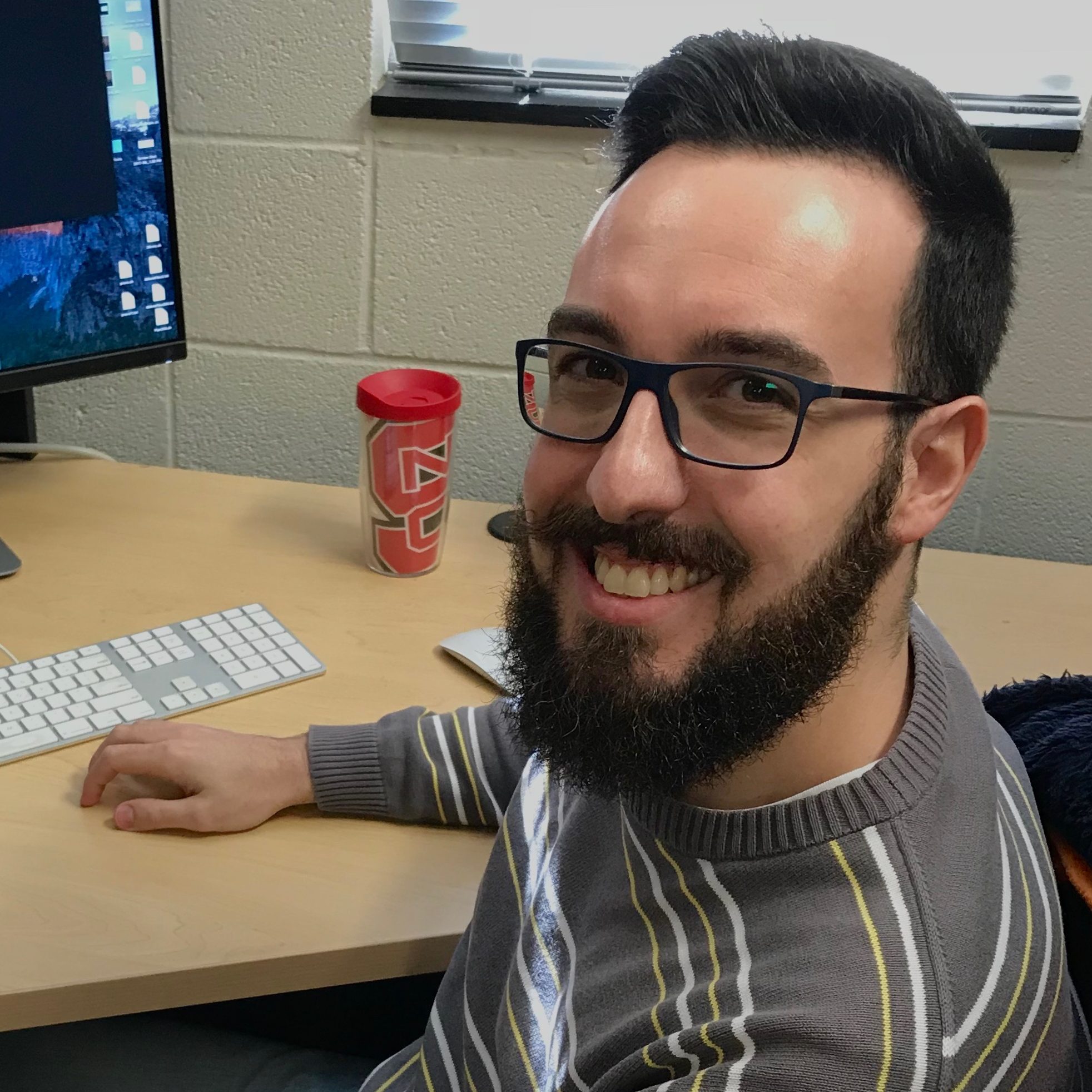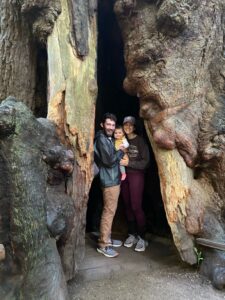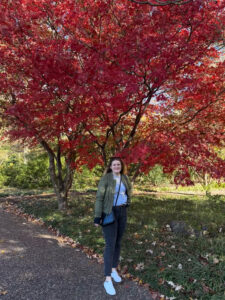Alumni Testimonials
Alumni Testimonials
Dr. Samuel Widmayer
Associate Computational ScientistThe Jackson Laboratory
PhD in Genetics, NC State University (2019)
B.S.In Ecology, University of Delaware (2014)
Graduating in the Fall 2019, Samuel has continued to pursue his love of research, experimentation, and writing at the Jackson Laboratory. There, Sam pursues his research “in an area of quantitative genetics and genomics. Many important traits for the health and survival of all types of organisms are driven by the effects of dozens to thousands of genes, as well as effects from different environments – which gives them the moniker of “complex traits”. Model organisms have been at the forefront of revolutionizing how these traits are studied because of their close genetic resemblance to humans, as well as their ease of manipulation in the laboratory. The Jackson Laboratory maintains a state-of-the-art population of mice (derived by the genetic mixing of several popular laboratory mouse strains) that exhibits similar genetic diversity to that of human populations. My current research efforts as a Computational Scientist are devoted towards supporting and developing computational pipelines that allow researchers to use this mouse population to study their favorite traits and reveal new drug targets for treating human diseases while accounting for important genetic differences between individuals.”
Sam’s time at NCSU helped to nurture his fascination with the natural world and skills as a researcher. Fondly thinking about to his time here, Sam is appreciative of the skilled faculty that helped develop him as a scientist saying “I was trained by some of the brightest minds in quantitative genetics and genomics and gained an enormous amount of new experience – in particular, in writing, experimental design, programming, and mentorship.” The environment the program fostered helped nurture and foster his critical skills as scholar.
Graduate education was significant for Sam. The assignments and process really refined his skills as a critical thinker, and he as applied those skills to every aspect oh his life as a scientist, whether work on an experiment, examining a manuscript, or writing his results. He asked himself the questions is this claim truly supported by the evidence and if this experiment actually answering his questions. Constantly posing these questions to himself provided a mental exercise that refined all of his work. As he reflects “learning to have a keen eye for detail and logic in graduate school made me a better scientist and teammate down the road”.
With his degree program behind him, Sam has a some words of seasoned reflection about graduate school to share. As he says “my final reflection is that to succeed in graduate school, you should always be open to collaboration or help. The only way to never know for sure whether your idea is as good as you think it is to never tell anyone! Whether it is someone in your life that you trust, or a lab mate, or your PI, or a collaborator, never doubt how helpful simply talking or drawing out an idea can be for improving an experiment, a figure, or a grant idea. In nearly every instance, I have learned something that I overlooked or could improve on by simply asking for help with it. It’s not an admission of weakness to want help, it’s a sign of emotional strength!”
We wish Samuel all the best as he continues his fantastic work as Computational Scientist with the Jackson Laboratory!
Selected Publications of Dr. Samuel Widmayer:

Fabio Morgante
Postdoctoral Scholar
University of Chicago, Chicago, ILPhD in Genetics, NC State University
M.R. in Statistics, NC State University
MSc in Animal Breeding and Genetics, University of Edinburgh (UK)
BS and MS in Agricultural Sciences, Università deli Studi di Firenze (Italy)Lab: Dr. Trudy Mackay
Fabio graduated with a PhD in Genetics in 2018, focusing in quantitative and statistical genetic research. Having earned his Masters of Statistics at NC State, he knew both the University and the graduate programs were strong. He was also interested in the opportunities available to Genetics PhD students, specifically the ability to work on a project that involved collaborating with Aarhus University in Denmark.
Fabio remained confident in his choice throughout the entirety of his doctoral study. He considers the Genetics Graduate Program to be well-rounded, offering an inclusive environment, high quality classes, and exceptional seminars featuring guest speakers with vast knowledge and expertise. He attributes this structure and the close work performed with his advisor to his successful development of “independence and collaboration with other people”, preparing him for the research he conducts now as a postdoctoral scholar at the University of Chicago.
Through this training and mentorship under a leading authority in Genetics, Fabio was able to practice tremendous work within the Genetics program and beyond. His efforts received various awards and recognition, some of which are listed below:
- -GenSAP PhD Fellowship, Center for Genomics Selection in Animals and Plants, Aarhus University (Denmark
- Genetics Provost Research Award, Program in Genetics, North Carolina State University
- Membership in Honor Society of Phi Kappa Phi, North Carolina State University
Anna graduated with her PhD in Genetics in 2021, pursing research paths in quantitative genetics, and to be part of what she describes here at NCSU as a “set of programs in breeding from traditional row crops to horticultural crops, trees, and even animal breeders”. Anna now spends her time as a data scientist for Bayer Crop Science researching “GxE and applications to plant breeding for adaptation to local environments” to help discover new ways to deal with future pressures we might face. Her passion for genetics started as an undergrad at Iowa St. University where she “really enjoyed doing research in the wet lab, field nursery, but my favorite part was doing statistical analyses on the data we collected. I was pursuing a genetics degree and a statistics degree at the same time, and knew that I wanted to go onto graduate school to further my research skills. I also wanted to explore questions related to plant breeding and genetics with a heavy focus in statistics, and be able to translate that heavily quantitative research into applied solutions to problems in agriculture”. It was this passion and drive that led her join our Graduate program and eventually Jim Holland’s lab. What she “really loved [about NCSU was] flexibility that the genetics program allowed for me to ‘Choose my adventure’ (as an Iowa State alum had to get one of those in here), which gave me the freedom to bring in courses in breeding, statistics, and crop science outside the traditional genetics curriculum as electives and really get the education I was looking for.”
The flexibility and varied opportunities that the lab Anna joined really helped her explore who she wanted to be as professional. As she says “My time as a graduate student was spent in the field during the summer and doing data analysis most of the rest of the year. Being in a lab that had me in the field taking data and analysing said data after was important to me so that I could better understand what the data meant, how it was collected, and how to communicate with people outside of the lab (many of whom are far more knowledgeable about matters in the field than I am)…Grad school, and Jim’s lab in particular, gave me a chance to really explore both the different functions in research (field research, assays, data analysis) and questions that I wanted to answer”. Being part of a dynamic lab and a graduate program with peers in many different fields/asking different research questions gave Anna the opportunity to work in a collaborative environment and approach questions with new point of views, deeply embodying the potential and strengths of interdisciplinary programs! That community spread through the university helped give the support she needed to actualize as professional and grad student.
If Anna could give current and prospective grad students some words of wisdom, she would say:
“1) Don’t be afraid to own your educational path: At one point someone at ISU told me I shouldn’t pursue both genetics and statistics because I wouldn’t be able to find a job. That has not been the case at all and I’m thankful to have pursued my passion for quantitative genetics.
2) Make sure to try out different pathways: Take an internship in private industry or your favorite government agency. If you enjoy it, you’ve opened up a potential new path. If you don’t, at least you’ll have given it a go and know what you want to be doing.
3) Community: See examples throughout previous answers & go have a ‘Hell Yes Ma’am’ at Raleigh Brewing Co with your favorite Genetics Program people.”
We look forward to the excellent work and contributions to the scientific community Anna will continue to create at Bayer!

